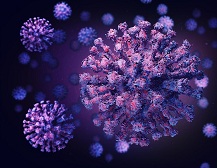COVID-19 And Cancer: Study Shows That SARS-CoV-2 And Usage Of Anti-COVID-19 Drugs Can Reactivate Oncogenic Viruses And Increase Risk Of Cancer
Source: COVID-19 And Cancer Oct 03, 2020 5 years, 4 months, 2 days, 15 hours, 52 minutes ago
COVID-19-Cancer: A new study by researchers from The University of Arkansas for Medical Sciences (UAMS) have shown that SARS-CoV-2 encoded proteins along with certain drugs currently used in COVID-19 treatment protocols are able to induce lytic reactivation of Kaposi’s sarcoma-associated herpesvirus (KSHV), one of major human oncogenic viruses through manipulation of intracellular signaling pathways.

The research findings has generated a lot of interests among many leading oncologists and the study findings although being published on a preprint server is currently being peer reviewed by a few parties.
https://www.biorxiv.org/content/10.1101/2020.10.02.324228v1
It has been seen that besides severe respiratory and systematic symptoms, several comorbidities may also increase risk of fatal COVID-19 disease outcome and it might also cause certain new chronic medical issues or diseases.
Thailand medical news had previously written an article questioning the possibility of the SARS-CoV-2 coronavirus causing cancer either in the short term or long term after as it is a well long fact that many viral infections can subsequently lead to various forms of cancers developing.
https://www.thailandmedical.news/news/must-read-covid-19-questions-can-the-sars-cov-2-coronavirus-ultimately-also-cause-cancer
The study team reported that SARS-CoV-2 encoded proteins and some anti-COVID-19 drugs currently used are able to induce lytic reactivation of Kaposi’s sarcoma-associated herpesvirus (KSHV), one of major human oncogenic viruses through manipulation of intracellular signaling pathways.
The study data indicate that those KSHV+ patients especially in endemic areas exposure to COVID-19 or undergoing the treatment may have increased risks to develop virus-associated cancers, even after they have fully recovered from COVID-19.
KSHV is the etiologic agent of several human cancers including Kaposi’s sarcoma (KS), Primary effusion lymphoma (PEL), and Multicentric Castleman’s disease (MCD), which are mostly seen in immunosuppressed patients. KS is an endothelialoriginated multicentric malignant neoplasm, while PEL and MCD represent two kinds of B-cell lineage disorders
https://pubmed.ncbi.nlm.nih.gov/26658701/
The KSHV oncogenic virus belongs to the human γherpesvirus subfamily, and has two alternating life-cycle programs following primary infection in host cells, the latent and lytic phases.
https://www.mdpi.com/1999-4915/12/9/1034
During latency, viral genomes persist as circular episomes with no progeny virion produced and only a limited number of latency-associated genes are expressed. Once entering the lytic phase, almost all viral genes are expressed, followed by the replication and release of mature virions. Recent findings have indicated that both viral latent and lytic proteins can play a pivotal role in the initiation and progression of virus-associated cancers.
https://www.frontiersin.org/articles/10.3389/fmicb.2017.00613/full">https://www.frontiersin.org/articles/10.3389/fmicb.2017.00613/full
In the study the researchers tried understand if COVID-19
infection and the related treatments affect KSHV replication and increase the risk of developing virus-associated cancers, and how these mechanisms work.
Studying the cellular pathways, data indicated that SARSCoV-2 has the potential to induce KSHV lytic reactivation.
It was also found that some drugs currently used for treatment of COVID-19 patients may affect KSHV lytic reactivation. A total 6 drugs reported were used in the study, including Azithromycin, Chloroquine diphosphate, Hydroxychloroquine sulfate, Nafamostat mesylate, Remdesivir, and Tocilizumab .
Through screening with iSLK.219 cells, the study team identified that two of these drugs, Azithromycin (an antibiotic) and Nafamostat mesylate (a synthetic serine protease inhibitor), greatly induced KSHV lytic reactivation in a dose-dependent manner under the condition with low dose Dox induction.
Furthermore, both Azithromycin and Nafamostat mesylate treatment promoted the production of mature virions as detected using an infectivity assay in which the supernatants from induced iSLK.219 cells were used to infect HEK293T cells
. Surprisingly, one more drug, Remdesivir (an adenosine analog) also displayed induced effects on BCP-1 cells, which were not seen on iSLK.219 cells. Some major intracellular signaling pathways such as MAPK and NF-κB have been reported to closely regulate KSHV lytic reactivation. Here the team found that treatment with Azithromycin upregulated MAPK signaling activities (increased phosphorylation of JNK, ERK and p38 kinases), while Nafamostat mesylate treatment downregulated NF-κB activity (reduced phosphorylation of p65) from KSHV+ PEL cells.
These drugs may facilitate KSHV dissemination as well as initiate viral oncogenesis in those KSHV+ patients exposed to COVID-19 and the related treatments, especially in the case of immunosuppressed patients.
Therefore, these patients need follow-ups to monitor KSHV viral loads and virus-associated malignancies development risks, even after they have fully recovered from COVID-19.
Importantly, a few studies have reported the reactivation of several herpesviruses in a small number of COVID-19 patients.
https://onlinelibrary.wiley.com/doi/abs/10.1002/jmv.26549
https://www.ncbi.nlm.nih.gov/pmc/articles/PMC7436688/
https://onlinelibrary.wiley.com/doi/full/10.1111/ijd.15001
It remains unclear whether pre-existing KSHV may affect SARS-CoV-2 infection, especially because it is a member of the herpesvirus family which can easily establish lifelong infection in a host.
The study team previously demonstrated that KSHV de novo infection upregulated the expression of one multifunctional glycoprotein, CD147 (also named as Emmprin or Basigin), which was also strongly expressed in KS tissues
Interestingly, CD147 was recently found to be one of co-receptors to facilitate SARS-CoV-2 entry and invasion of host cells (Wang et al., 2020). Therefore, it will be interesting to explore the potential association between KSHV and these SARS-CoV-2 receptors or co-receptors in different types of host cells.
https://www.thailandmedical.news/news/breaking-new-coronavirus-research-shows-that-the-sars-cov-2-coronavirus-has-a-fourth-route-of-attacking-human-host-cells-making-it-a-real-super-virus
Considering that a large population of individuals are carrying the KSHV herpeviruses and also other herpesviruses, it is important that more research is focused on this area and also COVID-19 recovered patients should also focus on getting regular cancer screenings.
For more on
COVID-19-Cancer, keep on logging to Thailand Medical News.
